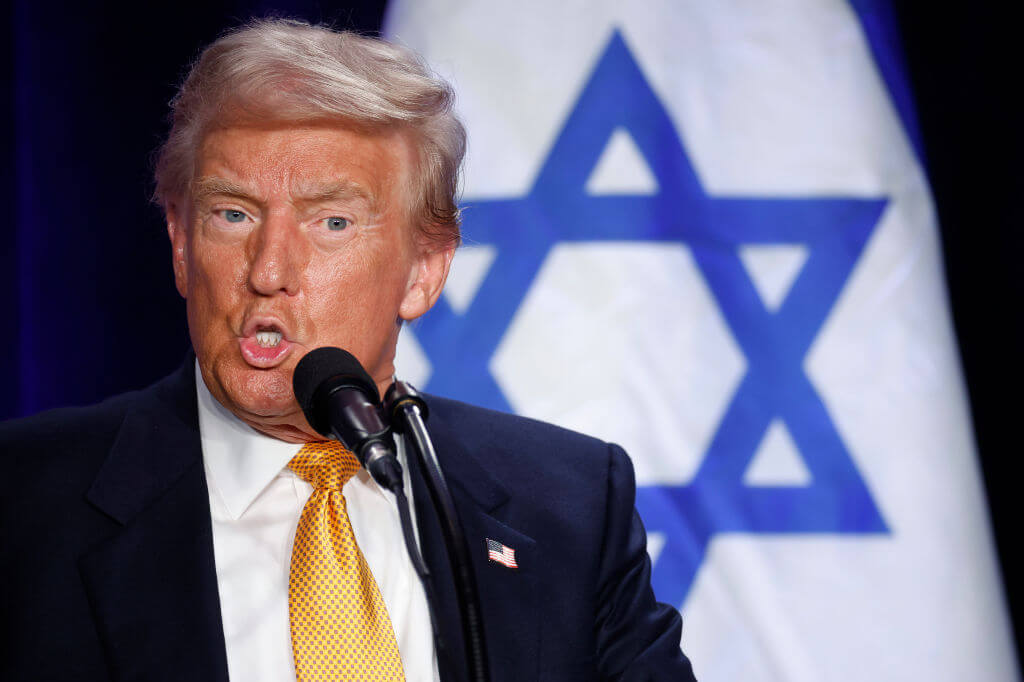Trump refused to visit Columbia after antisemitic campus protests, new book claims
Michael Wolff alleges that Trump offered ‘half-hearted’ support for Israel following the Oct. 7 attack, but tweaked his position during campaign

Donald Trump on Sept. 19, 2024. Photo by Chip Somodevilla/Getty Images
President Donald Trump declined to visit Columbia University last April to show support for Jewish students facing harassment during campus protests, journalist Michael Wolff claims in a new tell-all book.
“No students! No students!” Trump reportedly told House Speaker Mike Johnson during a phone call, rejecting an invitation to visit Columbia University while in New York for his trial on falsifying business records, according to Wolff’s All or Nothing, set for release Tuesday.
The pro-Palestinian protests on campus intensified after a House hearing highlighted antisemitism at Columbia and the school’s authorization of a police crackdown on students. In the political fray, Republicans saw an opening to court the Jewish vote.
One official involved in the invitation later described the idea as “stupid of me, really stupid,” according to exclusive excerpts obtained by the Forward. Johnson and some GOP House members were met with boos and pro-Palestinian chants on the steps of Columbia’s library. “Neither Israel nor these Jewish students on this campus will ever stand alone,” Johnson said.
On that trip to New York, Trump made a campaign stop with supporters at a bodega in Harlem. The president “appeared only before admiring audiences,” Wolff writes.
A Johnson spokesperson called the Wolff report “completely and entirely false.” It “calls into question the veracity of the rest of this ‘book,'” said Taylor Haulsee, a spokesperson for the House leader. “Wolff’s latest work of fiction is clearly better suited for fans of gossip and nonsense rather than truth. Readers looking for accurate reporting should shop elsewhere.”
The book also suggests that Trump offered “half-hearted” support for Israel following the Oct. 7 attack. In an Iowa campaign speech on that day, he condemned the attack and urged the U.S. to stand with Israel — but his comments quickly shifted to critiquing the Biden administration’s Iran policy and noting that he was not in office at the time.
He later criticized Israeli Prime Minister Benjamin Netanyahu’s handling of the war in Gaza and suggested the Israeli leader should pay a price for the security failures leading up to the Hamas attacks.
However, after clinching the GOP nomination and — receiving a $100 million commitment from Miriam Adelson, his top Jewish donor — Trump promised major donors he would support Israel’s war on terror and called for retribution against pro-Palestinian campus protesters. He also met with families of Israeli hostages and helped secure a ceasefire-hostage deal.
Since assuming office in January, Trump has received widespread praise from lawmakers and Jewish groups for his executive order targeting antisemitism on college campuses. Earlier this month, the Department of Education launched investigations into alleged “widespread antisemitic harassment” at five universities, including Columbia.
Representatives for Trump and Johnson did not immediately respond to a request for comment. Steven Cheung, the White House communications director, said in a statement to the Daily Beast that Wolff “routinely fabricates stories originating from his sick and warped imagination.” Wolff faced accusations of factual inaccuracies in a previous book about Trump.
This post was updated with a statement by a representative of House Speaker Johnson.













